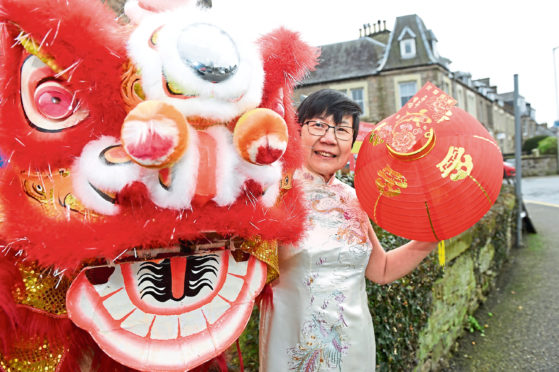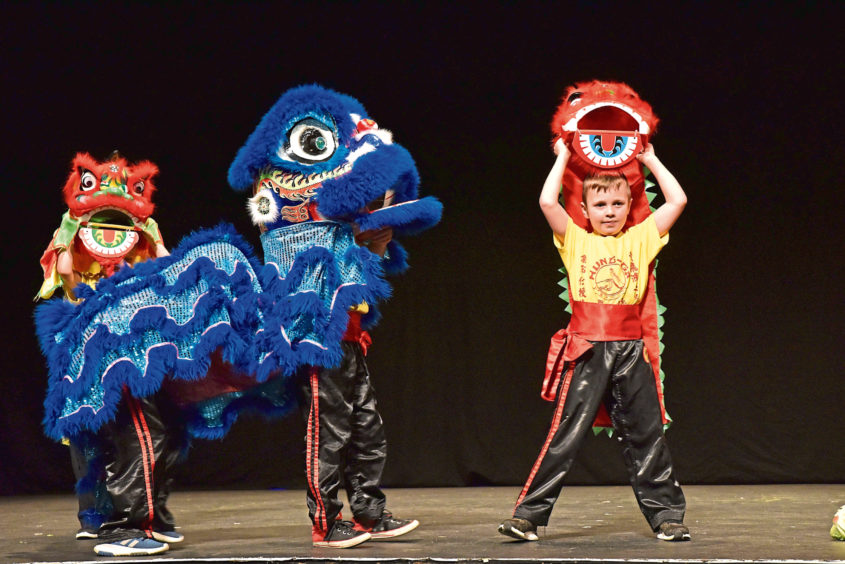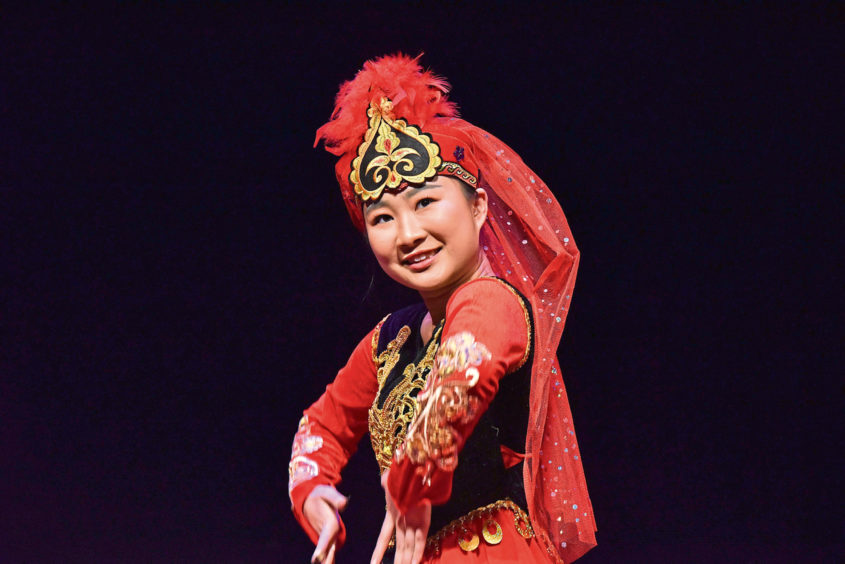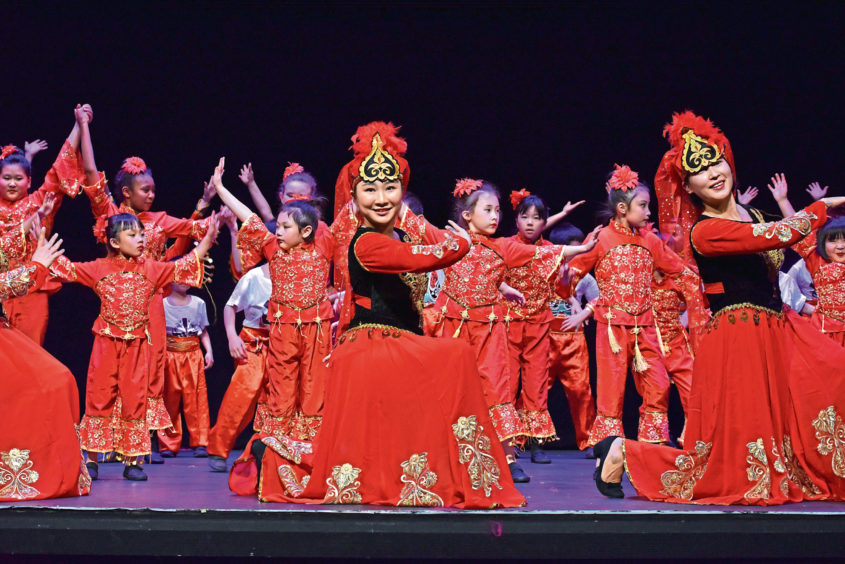Celebrations for Chinese New Year would normally see flamboyant parades across the north and north-east.
But with the streets empty, will the Spring Festival still be marked by the Scottish Chinese community?
The beat of the drums and a shimmering burst of colour, as a fiery red dragon weaves its way through the streets.
A resplendent lion rears up on its hind legs, yellow tassels shaking in time to the music.
People line the pavements to take in the spectacle, which reaches a frenzied firework finale.
Chinese New Year is celebrated around the globe, and is also referred to as the Spring Festival in line with the traditional Chinese calendar.
It marks the end of winter and the beginning of the spring season, and is one of the most important holidays in China.
It is a time of hope, of new beginnings – with family coming together at a reunion dinner after giving their house a thorough clean, in a bid to sweep away any ill fortune and make way for good luck.
China may be thousands of miles away, but there is a vibrant Scottish Chinese community.
From Inverness to Aberdeen, we could normally look forward to learning more about another culture with colourful parades and shows.
Just as Covid-19 called a halt to Hogmanay, it also means that these very public displays of celebration have been impacted around the globe.
But that does not mean to say that February 12 will pass by unmarked, for there is no forgetting traditions which span back centuries.
your life spoke to those who have still found a way to celebrate the occasion, and discovered what Chinese New Year is really about.
Monica Lee-Macpherson MBE: ‘Chinese New Year will be just as special’
Monica is a difficult woman to get hold of, for she can normally be found cooking dozens of meals in the Highland capital.
As the proud owner of an eco-friendly cafe, she has spent the pandemic putting together tasty dishes – with an army of volunteers on hand to deliver food to vulnerable people.
She also works with the charity Fareshare, in a bid to tackle food waste.
Monica is still looking forward to Chinese New Year however, despite the fact that she would normally be at the heart of the celebrations.
She was awarded an MBE in 2016 for her contribution to the Chinese community in Moray and the Highlands.
“I was the first Asian lady in the Highlands to receive an MBE,” she says, with the hint of a smile in her voice.
“I set up the Scottish Highlands and Islands and Moray Chinese Association (SHIMCA) in 2004 and we had just over 100 members.
“We are the only association beyond Perth and Aberdeen, and now we have around 700 members.
“There was this belief in Inverness that Chinese people keep themselves to themselves. And it has been my mission that we wouldn’t do that, we would embrace Scottish culture and vice versa.
“We are not there yet, but we are getting there.”
SHIMCA would normally hold a huge banquet in order to mark the new year, before taking to the streets with a lion dance parade.
“I remember we had our first celebration and 80 people turned up, there was standing room only,” says Monica.
“Every year we do the parade which is watched by hundreds of people.
“The children love it, we start in Elgin then go to Nairn and end up in Inverness.
“We’re bang in the middle of the high street, and the ceremony is called the waking of the lion.
“We give out red envelopes with chocolate coins in to share our culture, and I’ve given a lot of talks in primary schools to explain what we are doing and why.
“Young people are very receptive, and I’ve made it my mission to help educate them.
“So at the cafe, for example, I grow Chinese vegetables and do traditional home cooking.
“We’d normally be so busy because every year I do a big dinner, to show people what we eat and why.”
Although the cafe may be closed due to restrictions, Monica still plans to celebrate New Year.
“One of the traditions is house cleaning before New Year’s Eve,” she says.
“You get the whole family involved and give away old things.
“There was a tradition in Hong Kong where I grew up, of settling bills so you didn’t go into the new year with any debts.
“But don’t forget I’m 66 now, so traditions may have changed.
“We make these little parcels with flour, peanut and sesame and deep fry them.
“Just like Hogmanay, Chinese New Year is very important.
“There would normally be a reunion dinner, where everyone comes back together. “Of course, that won’t be possible this year, although in China it’s common for your parents to live with you.
“There’s nine dishes, including one dish which you must not touch until the following day. This is to symbolise abundance.
“Two weeks before the celebrations, everyone would be trying to get home.
“Bus, train, plane, all methods of transport are really busy.
“In rural areas of China, people normally save up all their holidays so they can take the time off.
“The young and old sit together and say, what have you been doing this year?
“There’s a flower market and children are allowed to stay up late in order to pick flowers and take them home.
“The flower represents new life for the coming year.”
Monica can recall a mad scramble in the morning, as she rushed to wish her parents happy New Year.
“So we’d put on our new clothes and take our parents a cup of tea,” she recalls.
“You’d receive a red envelope which had money in it. There were seven of us in my family, so you had to try really hard to get there first.”
Similar to the Scottish tradition of first footing, families then visit one another with gifts.
“Everywhere you go, you wish people good luck,” says Monica.
“My mum would give us a big bag of oranges, and at each house you ask your relative to take a piece of fruit.
“You wouldn’t offer biscuits, because that can mean illness.
“Your relative would take a piece of fruit and put a red envelope back in.
“By the end of the day, the bag would be much lighter. That’s why we all used to fight over who carried it.”
Monica believes celebrations will still take place in people’s homes, even though parades cannot go ahead.
“It’s just as important and it’s a way of maintaining our culture,” she said.
“I have no doubt that people will be celebrating within their homes, but some people will be unable to make it back for the reunion dinner.
“It’s really difficult not to have the parade because it is one of the main attractions.
“We’d normally make a lot of noise to frighten the old year away.
“I’ll still FaceTime my mum – she’s 92 and lives in Hong Kong.
“She’s still working as a volunteer in a day-care centre, I have a lot to learn from her.
“New Year will be just as special here in Inverness, and I will be wishing happy New Year to as many people as possible.”
Professor Michelle Macleod Director of The Confucius Institute at Aberdeen university
The Confucius Institute was set up in 2013 in a bid to provide Mandarin language teaching and Chinese cultural activities for the Aberdeen community.
It now offers the biggest celebration of Chinese New Year in the north-east, and the event has soared in popularity year on year.
Professor MacLeod has been involved with the institute for five years, after deciding to learn the language.
She is hopeful that people will still be able to celebrate, albeit virtually.
“I started learning the language at the institute, and it was so exciting to find out about a completely different culture,” she said.
“I gradually became involved, and the events we put on have steadily grown in popularity. We did shows in Aberdeen and Inverurie due to demand.
“We would normally have a spectacular gala show performance, family fun day and visits to local schools.
“Youngsters really engage with the culture, and the celebrations are incredibly colourful.
“Last year, we moved our gala show off campus as it had outgrown its usual university campus venue; we were thrilled to nearly fill the city centre’s Tivoli Theatre with more than 500 guests who were treated to performances by university students, Confucius Institute teachers and community friends.
“Our annual family festival in Elphinstone Hall was as popular as ever, with well over 800 in attendance to try their hand at Chinese crafts, games and music.
“We also took Chinese New Year celebrations to 21 schools in Aberdeen City and shire. All in all we engaged with over 4,000 people.”
At a time when we are told not to mix with people outside our own household, how can Chinese New Year still be marked?
The team has put together a virtual programme which has been kept under wraps since November.
“Obviously we cannot all gather to celebrate the occasion this year,” says Professor MacLeod.
“However, recognising what an important time of the year it is for many of our students, staff and local community, we will be celebrating Chinese New Year virtually with the streaming of a gala show made by our students and friends of the Confucius Institute.
“It will include participants from across the globe recording acts to be put together into a show-reel of talent.
“While mobility is currently restricted, we are really excited to be able to bring together students and friends from across the globe in this way – to produce something that will be shared on various social media platforms internationally, with Aberdeen at its heart.
“The planning for the show, which is being produced with the help of a professional production company, began in earnest in November.
“The challenges in pulling together the show included ensuring that all of our regular stakeholders and contributors got the opportunity to participate; we have collected videos from local students and families as well as contributions from former teachers and students in China,” says Professor MacLeod. “Luckily lots of friends of the institute wanted to contribute, and we have an exciting mix of Chinese cultural talent with a little Scottishness to make sure it is rooted here in Aberdeen.”
Click here for tickets to the virtual Chinese New Year gala.



